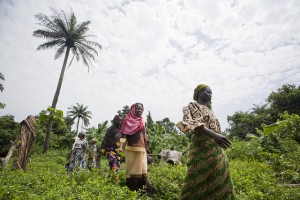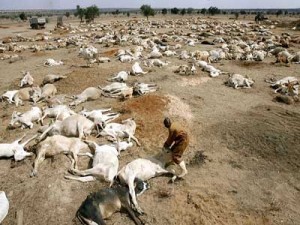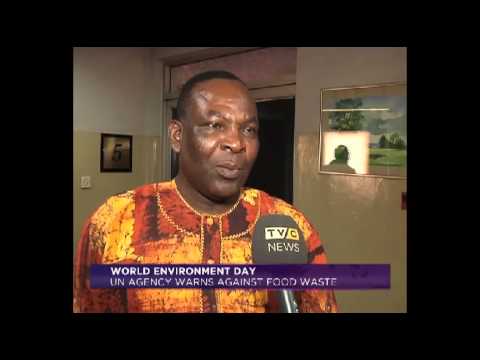Nigerian, other African journalists explore water financing
Twenty journalists from Nigeria and nine other West African countries on Monday commenced a weeklong capacity building/training on water financing and protection within the sub-region.

The workshop, which is holding in Abidjan, Ivory Coast, is organised by the International Union for Conservation of Nature (IUCN) and the Global Water Partnership for West Africa (GWP/WA) to strengthen the capacity of media professionals; sensitise on economic tools for sustainable management of natural resources; and provide support to the production of quality information that will lead to greater mobilisation of stakeholders around the financial needs of different activities in the water sector.
Workshop organisers explained that, by subscribing to the Millennium Development Goals, the United Nations member states committed themselves to reduce by half the proportion of people without access to safe drinking water by 2015.
According to them, “At the Earth Summit in Johannesburg in 2002, was made the additional commitment for 2015” to have the proportion of people without access to basic sanitation.
Communications Officer of GWP/WA, Sidi Coulibaly, in a statement explained that the international community has begun to realise the importance of better management of water resources and is committed to promote Integrated Water Resources Management (IWRM) as a priority.
He said the pressure of population growth weighs on the resources, adding that, in spite of recent efforts, there are still regional deficiencies in coordination, governance, legislation and financing of the water sector.
He explained that risks related to water such as floods, droughts, conflicts and waterborne diseases are not controlled and that the potential of water in West African region are still under-exploited in the area of hydropower, irrigation and ecotourism.
“In addition, many countries in West Africa suffer from high rainfall variability that their infrastructures and management capabilities are insufficient to mitigate. This problem hampers their development and their efforts to fight against the poverty.
“Given these facts, it is clear that a lasting solution can be sought through better governance and a more adequate funding of the water sector. The effort to produce must be that of all the stakeholders, so it cannot be solved if all its members, cities, regions, NGOs, civil communities, management services, companies, banks, multilateral organisations, and not only the states of North and South, accept to change deeply their behaviours and approaches. Everyone must redouble efforts including financing, projects management and often their relationship with environmental conservation,” he stated.
Coulibaly stressed that it is necessary to create a multi‐stakeholder response to the financial needs of different activities in the water sector, with a view that water resources are used and managed in a fair and sustainable way to reduce poverty, the socio‐ economic development, regional integration and environmental protection.
He mentioned that it is also important to use new approaches, new economic and financial tools, such as payments for environmental services, to help ensure the proper protection of the resource.
The IUCN and GWP/WA, through the initiative for Poverty Reduction and Environmental Management (PREMI) are saddled with the role to inform, educate and advocate dialogue between stakeholders who can facilitate sustainable practices and equitable sharing of benefits derived from the exploitation of resources.
By Kayode Aboyeji, in Abidjan
Shared value and sustainability
The concept of shared value entails policies and operating practices that enhance the competitiveness of a company while simultaneously advancing the economic and social conditions in the communities in which it operates. Shared value creation focuses on identifying and expanding the connections between societal and economic progress.
 The concept rests on the premise that both economical and social progress must be addressed using value principles. Observers believe that the concept has the power to unleash the next wave of global growth.
The concept rests on the premise that both economical and social progress must be addressed using value principles. Observers believe that the concept has the power to unleash the next wave of global growth.
Indeed, an increasing number of companies known for their hitherto hard-nosed approach to business have begun to embark on important shared value initiatives. Some of such organisations include: Google, IBM, Intel, Johnson & Johnson, Nestle, Unilever and Wal-Mart.
According to experts, ways companies can create shared value opportunities are: by reconceiving products and markets; by redefining productivity in the value chain; and by enabling local cluster development.
Michael Porter and Mark Kramer, both of the Harvard University in the US, distinguish between creating shared value (CSV) and corporate social responsibility (CSR).
They claim that CSR programmes focus mostly on reputation and have only a limited connection to the business, making them hard to justify and maintain over the long run.
In contrast, they add, CSV is integral to a company’s profitability and competitive position, leveraging the firm’s unique resources and expertise to create economic value by creating social value.
It is believed that opportunities to create shared value arise because societal problems can create economic costs in a firm’s value chain. Excess packaging of products and greenhouse gases are costly to both business and the environment.
Wal-Mart, for example, was able to address both issues by reducing its packaging and rerouting its trucks to cut 100 million miles from its delivery routes in 2009, saving $200 million even as it shipped more products. Innovation in disposing of plastic used in stores has saved millions in lower disposal costs to landfills.
Energy use throughout the value chain is being reexamined, whether it be in processes, transportation, buildings, supply chains, distribution channels, or support services. The British retailer Marks & Spencer’s ambitious overhaul of its supply chain, for example, which involves steps as simple as stopping the purchase of supplies from one hemisphere to ship to another, is expected to save the retailer £175 million annually by fiscal 2016, while hugely reducing carbon emissions.
Heightened environmental awareness and advances in technology are catalysing new approaches in areas such as utilisation of water, raw materials and packaging, as well as expanding recycling and reuse.
For instance, by 2010, Coca-Cola had reduced its worldwide water consumption by nine percent from a 2004 baseline, representing nearly halfway to its goal of a 20 percent reduction by 2012. Also, Dow Chemical managed to reduce consumption of fresh water at its largest production site by one billion gallons – enough water to supply nearly 40,000 people in the US for a year – resulting in savings of $4 million.
More recently, firms have been outsourcing to suppliers in lower-age locations. Some are beginning to understand that marginalised suppliers cannot remain productive or sustain/improve their quality.
Nespresso, one of Nestle’s fastest growing divisions, has been practicalising this idea. Nespresso combines a sophisticated espresso machine with single-cup aluminum capsules containing ground coffees from around the world. Offering quality and convenience, Nespresso has expanded the market for premium coffee.
Most coffees are grown by smallholder farmers in impoverished rural areas in Africa and Latin America, who are trapped in a cycle of low productivity, poor quality and environmental degradation that limits production volume.
To address these issues, Nestle redesigned procurement, working closely with its growers by providing advice on farming practices, guaranteeing bank loans, and helping secure inputs such as plant stock, pesticides and fertilisers.
Nestle established local facilities to measure the quality at the point of purchase, which allowed it to pay a premium to better beans directly to the growers and thus improve their incentives. Greater yield per hectare and higher production quality increased growers’ incomes, and the environmental impact of farmers shrank. Meanwhile, Nestle’s reliable supply of good coffee grew significantly. Shared value was created.
In Nigeria, officials of the organisation insist that operations are aimed at minimising the environmental impact of food production and optimising environmental performance across the entire value chain.
During a facility tour conducted by DevComs Network, Nestle CEO Dharnesh Gordhon notes that the company continuously reduces its carbon footprint by ensuring efficient use of energy for manufacturing operations.
DevComs Network director Akin Jimoh says his outfit’s involvement in CSV media capacity building is part of efforts to achieving a more relevant professional development of journalists and media practitioners in a manner that they can contribute meaningfully to national development.
“We want a media that addresses issues rather than cover events. This is the second CSV activity encompassing key areas in nutrition, water, agriculture, rural development and environmental sustainability. And there is a role for everyone beyond the usual jamborees of event reporting,” he discloses.
Reactions trail Obama’s historic climate plan

Reactions have trailed plans unveiled on Tuesday by US President, Barack Obama, to combat climate change.
Observers say that though the plan isn’t perfect, it nonetheless contains many important steps.
Most importantly, the plan calls for the regulation of carbon emissions from U.S. power plants and an end to U.S. support for new coal plants overseas.
The Earth Day Network says: “These are monumental steps in the right direction.”
Executive Secretary of the United Nations Framework Convention on Climate Change (UNFCCC), Christiana Figueres, stresses: “President Obama’s climate action plan is a necessary next step to meet an immediate, worrying shortfall in action to deal with climate change and can be a critical move forward on the path towards a new, global climate agreement. It remains vital that the United States as the world’s largest developed economy is seen to be leading serious action to deal with climate change, both at home and abroad. These new steps will help to meet those goals, if they are implemented to the fullest extent to which they are intended.
“It is significant that the new plan aims to start up rapidly and covers the full menu of solutions to climate change: clean energy, renewable energy, energy efficiency and the many actions that all countries need to take to adapt to accelerating climate change. This climate action plan should be positive for the US economy and the economies of other countries, as the US shifts faster towards a sustainable, low carbon model, including addressing directly the heaviest sources of emissions from unmodified coal and gas plants.
“When the United States leads action, it also encourages more rapid international efforts to combat climate change by strengthening political trust, building business momentum and driving new technology solutions. We are fast approaching 2015, the year in which governments of the world have committed to agree an ambitious policy framework to curb greenhouse gas emissions and better enable the poorest and most vulnerable nations to adapt to climate change. This new agreement will enter into force from 2020 and must be unambiguous in providing the crystal clear signals and international mechanisms that will accelerate the domestic policy and business investment decisions required to keep the world below a maximum 2 degrees Celsius average temperature rise. To get there, we need immediately stepped up action on the part of government at all levels and by business.
“I applaud the fact that the US intends to play a leading role by helping to forge a truly global solution to climate change that galvanizes international action to significantly reduce emissions, prepares for climate impacts, and drives progress through the international negotiations. This US climate action plan must also be leveraged into fresh, high-level political consensus among countries that will smooth the way for faster progress in the international climate change negotiations under the United Nations.”
Dr Simon Anderson, Head of IIED’s (International Institute for Environment and Development) Climate Change Group, submits: “The emphasis on strengthening local governance for adaptation planning, developing new risk management tools and climate adaptation technology is helpful. Framing this section in terms of ‘security’ is misguided and is likely to bias the way that resources are deployed for this objective. The main instrument for addressing this objective is and will be USAID – an agency that notoriously acts in isolation and seldom consults adequately with country governments before implementing such initiatives. Examples include the USAID-funded projects Hariyo Ban in Nepal, and REGAL-IR in Kenya.
“The resources mobilised so far by the US and other industrialised countries are dwarfed by the imposed costs of increased climate variability on the economies and societies in the developing world. Optimistic assumptions of the scale of private sector contributions to resilience investments have proved so far to be ‘pie in the sky’ and there is no evidence that this will change any time soon – at least until medium term profits can be guaranteed to investors. The cases of failed weather-indexed crop insurance show how reluctant the private sector is to outset the costs of adaptation to the climate vulnerable.
“The US cannot claim to have led anything in the negotiations so far – apart from some obfuscation. If Obama’s emphasis on ‘ambition, inclusiveness and flexibility’ leads to support for common but differentiated responsibility for emissions reductions and contributions to finance for adaptation then this is to be welcomed.”
Dr Saleemul Huq, Senior Fellow, Climate Change Group at IIED, states: “This is the first time that the Federal Government has announced significant adaptation actions at home, reflecting the fact that – importantly – Obama recognises that the United States faces adverse impacts from climate change that it must adapt to. On the international level however the promises for action, while welcome, are too little too late! While it is good to see a leader of the world’s richest country and biggest cumulative polluter finally promise to take actions, after over a decade of refusal to do so, the problem has become much bigger while the US was ignoring it. Hence the world is now headed towards 4-degree temperature rise by 2100 unless much more drastic actions are undertaken on mitigation by all countries including the United States. President Obama says he wants the US to lead this effort globally. His promise is welcome, but his actions still fall short of what is required.”
Groups express concern over World Bank climate report on West Africa
Food production in Western Africa will be hit by more frequent and more extreme heat waves and droughts if the climate continues to alter at its current pace, according to a new report released by the World Bank.

The report, titled “Turn Down the Heat – Climate Extremes, Regional Impacts and the Case for Resilience”, takes an in depth look at what climate change means for sub-Saharan Africa. It compares the impacts on the region if warming continues at its current rate with impacts if governments successfully limit average global temperature rise to 20 Celsius.
While not removing the risk altogether, if temperature rise is kept under 20 Celsius, and comprehensive plans to adapt communities to climate change are put in place, many of the worst impacts can be avoided.
However, even at 20C, poverty reduction efforts and economic growth could potentially slump in the region as crop yields drop and water access problems are exacerbated, said Emmanuel Seck, Coordinator of Climate Action Network West Africa (CAN-WA).
For example, the median yield of all crops is expected to be reduced by 11 per cent at 20C. This is expected to double to over 20 per cent if warming reaches 40C. Furthermore, the length of growing period would also drop by 20 percent across the whole region.
While the livelihoods of families depending on fishing are also threatened, Senegal ranks among the most vulnerable countries to climate-change-driven impacts on fisheries. According to the World Bank, warming oceans mean there will be fewer fish and those that remain will be smaller.
Hotter weather will also mean fewer livestock can be maintained on land in northern Senegal’s Ferlo region as there will be less grass and fewer trees. Specifically, at 3°C warming, sub-Saharan savannah grasslands on which many communities graze their livestock will shrink to one-seventh their current size, with huge ramifications for those who rely on that ecosystem for their survival.
“This report highlights the threat the climate change poses to the hard won gains in development we have made in this region in recent years,” Seck said. “Africa needs support from the international community to adopt a low carbon approach to development that is compatible with meeting the human rights and needs of its growing population and consequently we remind developed countries to comply with their commitments in terms of mitigation and financing.”
Climate change of 2°C would lead to worse health for many people across sub-Saharan Africa. An increase in undernourishment, childhood stunting, malaria and other diseases could impact the ability of children to receive an education.
The CAN-WA called on African governments to implement low-carbon development and climate-resilient strategies in order to contribute to the reduction of the impacts of climate change on their populations.
National Coordinator of Climate Change Network Nigeria (CCN-Nigeria) and Chair of the REDD+ Working Group of the CAN-WA, Surveyor Efik, expressed similar sentiments with those of Seck.
Efik stated that the World Bank Report is indeed a clarion call to action for all stakeholders at the global, regional, national and local levels. According to him, the developed countries should end their politics of playing the ostrich game over their commitment towards emission cuts and support the developing countries with finance to combat climate change.
“Members of The G8 that just from the 39th edition of their meeting in Northern Ireland should keep to commitments as contained in a communiqué, if the world temperature should be turned down below 20C.”
The report warns that millions of people around the world are likely to be pushed back into poverty because climate change is undermining economic development in poor countries” and that “the case for resilience (adaptation) has never been stronger.
Efik states: “This indeed heightened our concerned for adaptation which is the priority action for ameliorating the impacts of climate change in West Africa that is known to be the poorest and most vulnerable sub-region on the African continent. We, therefore, call on the ECOWAS not to take the World Bank Report with a pinch of the salt but should redouble its efforts in terms of meaningful actions that will turn down the heat in West Africa and promote climate resilient development in the sub-region.
“At the national level, Nigeria with about 70 percent of its population being poor, there is the strong need to obey the clarion call to action that the report demanded. We call on the Federal Government to kick-start vigorously its own home-packaged actions, especially in terms of mobilising finance and not just depending solely on the UN-mustered finance or that of the developed countries.
“Regarding low carbon action, the Nigerian government should start with ending gas flaring in the country as that will encourage the developed countries to support our climate change agenda meaningfully and see us as genuinely committed to combating and responding to climate change.
“On adaptation, the National Adaptation Strategy and Plan of Action for Climate Change in Nigeria (NASPA-CCN) should be given the wings (finance) to fly so that climate resilience that will fortify Nigeria from the fierce impacts of climate change could be put in place. We commend the Minister of Environment, Hajia Hadiza Ibrahim Mailafia for developing the NASPA-CCN, which actually spelt out the roles and responsibilities of the federal, state, local, and private sectors as well as the civil society, donor agencies and individuals, regarding adaptation actions for climate-resilient Nigeria.
“The CCN-Nigeria, with a membership of 150 civil society organiszations across the country, is set with plans to promote NASPA-CCN and strengthen the capacity of stakeholders for effective implementation. This will be done through our National Advocacy Campaign for Adaptation in Nigeria (NACAN) starting from July 2013.
“We strongly believe that the impacts of climate change in Nigeria may undermine and disrupt our own home-grown development agenda – Vision 20:2020 and might further make the global one – MDGs fail in Nigeria, come 2015. It is not incorrect to state that for the development pillar of Nigeria (Vision 20:2020) to be adjudged successful in 2020, the effort of today’s government in removing the cog from the wheel (climate change impacts) will count.”
The CAN-WA is a global network of NGOs working to promote government and individual action to limit human-induced climate change to ecologically sustainable levels.
The CCN-Nigeria is a national coalition of over 150 civil society organizations (CSOs) from across Nigeria working to promote a climate-friendly nation though multi-sectoral approach and partnership.
Barriers to energy efficiency in the Ivory Tower
Insufficient awareness and lack of capacity to promote best practices have been identified as key barriers to the development of energy efficiency in Nigeria. This was the major observation a week ago in Abuja when representatives of the nation’s 128 state, federal and private universities gathered to explore ways to promote energy efficiency best practices and conservation in the Ivory Tower.

The university community has been identified as a major consumer of electricity such that a huge potential exist to save significant amount of energy in the sector. Observers believe that the universities are also well positioned to help spread the national energy efficiency culture.
Consequently, the Energy Commission of Nigeria (ECN), Federal Ministry of Environment (FME) and the United Nations Development Programme/Global Environment Facility (UNDP/GEF) in partnership with the National Universities Commission (NUC) held a day-long forum themed: “Promoting Energy Efficiency Best Practices and Conservation in Nigerian Universities”.

The event was aimed at enhancing the capacity of Nigerian universities to develop strategies and programme to reduce energy demand in their various campuses; and to enhance the capacity of Nigerian universities to promote best energy efficiency best practices and conservation.
Participants observed that there is absence of effective electricity metering systems in most of the universities, even as several offices, laboratories and residential buildings in the campuses are not metered, leading to high tendency to waste energy.
Apart from the use of inefficient appliances and poor consumer behavior that leads to energy wastage, many of the universities, participants submitted, do not have programmes and policies to promote energy efficiency best practices and conservation.

The university community is well positioned to spread the energy efficiency culture by integrating energy efficiency study into the university curriculum, they added, but lamented that this is currently absent in the university system.
It was likewise noted that most of the buildings in university campuses were built without putting into consideration the efficiency of the buildings, and that there are no incentives to encourage research and development (R & D) in the area of energy efficiency, leading to dearth of research material in this area.
It was however suggested that the NUC should partner with ECN and the UNDP/GEF to introduce energy efficiency studies into universities curriculum as General Studies. Likewise, participants want prepaid metering system installed in all the buildings and offices within the university campuses including staff quarters, shops and student hostels.
In a communiqué released at the close of the session, participants submitted: “Sensitisation on energy efficiency and conservation should be conducted regularly in universities to change behavior and attitudes of students and staffers.
“The universities should develop programmes and policies to promote energy efficiency culture in their various campuses, while government should make funds available in the national budget to support energy efficiency research and development.
“Yearly energy audit should be carried out in all universities and the audit should guide budgetary process in the institutions. Government should develop energy performance standards that will regulate the production, importation, distribution end-use appliances in the country.
“Government should provide incentives and subsidy to support the retrofitting of building in universities, which should conduct regular training for staff members and students on the importance of energy efficiency best practices. New designs, constructions and equipment supplies to all universities must represent energy efficiency application.”
Dignitaries present at the meeting include the Minister of Science and Technology, Prof. Ita Okon Bassey Ewa (who was represented by Dr. Mrs. Grace Ogolo, Deputy Director in the Ministry of Science and Technology); Director-General of the ECN, Prof. E. J. Bala; Minister of Power, who represented by the Dr. Godknows Igali Permanent Secretary, Federal Ministry of Power; Executive Secretary of the NUC, Prof. Julius Okojie; who was represented by Prof. Adebisi Balogun; and Minister of Environment who was represented by the Mr. M. T. Abu, Director of Planning Research and Statistics, in the ministry, and the GEF Operational Focal Point for Nigeria.
Etiosa Uyigue, National Project Coordinator, UNDP GEF Energy Efficiency Programme, states that the overall objective of the project is to improve the energy efficiency of series of end-use appliances used in residential and public sectors in Nigeria through the introduction of standards and labels and demand-side management programmes.
The project, he adds, will assist government to increase access to electricity and at the same time mitigate the emission of greenhouse gases resulting from energy generation.





